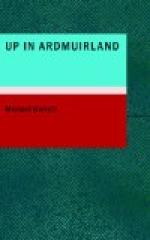I was most anxious to accompany him, and we set out at once for the Lamonts’ cottage.
Bildy looked frightfully wasted; his face was the color of parchment, and his brown eyes looked enormously large and startlingly bright. But what touched me more than his emaciated appearance was the wonderful expression of emotion which shone from those large eyes as we appeared at the bedside; they looked at Val with the yearning affection that one sees sometimes in a faithful dog. The poor fellow put out his white, wasted hand to Val with evident delight.
“Bildy’s been wearyin’ for ye, Father,” said Robina. “He’s often cried out for Father Fleming.”
The dying man’s eyes were proof that she spoke truly.
The short ceremony was soon over, and after some prayers for the sick man we took our leave. For the few days that he lingered after that, the visit of the priest—twice every day and sometimes oftener—was the culminating point of satisfaction for poor Bildy.
I was there with Val when the end came. Bildy passed away quite peacefully while we joined in the prayers for the dying; a calm smile was on his face, and some vision of delight before his wide-open eyes, which it is not for mortals to attempt to fathom.
“Poor fellow!” exclaimed Val, as we took our way home; “life has held little of happiness for him. Indeed, one can hardly call it life in the full sense of the word; it was mere existence, as far as we can see.”
“Let’s hope that life has begun for him at last,” I said reverently.
“I have little doubt of that,” replied the priest.
VII
SMUGGLERS
“My enemy’s
dog,
Though he had bit me, should have stood
that night
Against my fire.”
("King
Lear”—Act IV, Sc. 7.)
“Aebody kent Davie Forbes wes tarrible at the smugglin’,” said Willy.
We had been discussing the pros and cons of illicit distilling—known inland as “smuggling”—and I found that Willy agreed with the general opinion of the district that the only harm in it was the penalty due “’gin ye get foond oot by the gauger.” He assured me that in his young days the practice was widespread. This had brought us to Davie Forbes and his persistence in escaping government dues, and led on to the narrative which I here set down in intelligible English.
Davie was a fine, hearty specimen of a Scottish crofter, whose appearance did not tally with his acknowledged seventy-nine years; for his handsome, ruddy face, framed by white whiskers, and crowned with abundant, curly white locks, showed scarcely a wrinkle. He was stalwart and straight, too, as many a man twenty years his junior would dearly love to be.
Davie’s wife had been dead many years at the date of this story; his only daughter, Maggie Jean, was housekeeper for him and her two unmarried brothers, Jock and Peter. Like many of his fellows who might have to support a widowed mother or other helpless relatives, he had not married until rather late in life. Consequently, Maggie Jean, the youngest of the family, was a strapping lass of thirty, and Jock, the eldest, a “lad” of thirty-six; for an unmarried man in our neighborhood, be it known, is a lad till he becomes decrepit!




